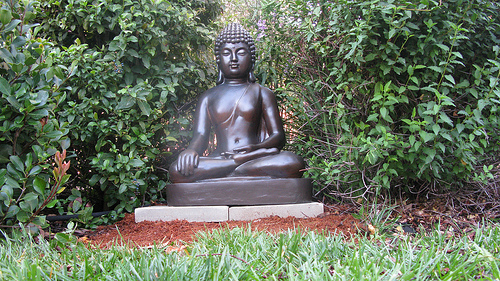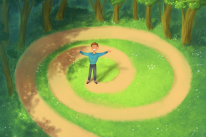“The final proof of greatness lies in being able to endure criticism without resentment.” -Elbert Hubbard
Sometimes criticism can feel like a ticking bomb that needs to be disposed.
Case in point: I receive emails about every comment left on the site. While I’ll glance at them peripherally to be sure they’re not spam that made it through the filter, I generally let them accumulate so I can respond to many all at once.
But sometimes, I’ll notice a harsh criticism, and suddenly feel this need to respond to it right now.
I’m not sure if it’s because I feel vulnerable having been publicly criticized, or because I feel the need to clear up misconceptions in order to feel a sense of control, but something in me shouts, “This is bad. Do something about it, and fast!”
Replying in a timely fashion is, of course, not problematic, but reacting with a Pavlovian fear response is a whole different story—one that raises the question: What is about criticism that feels so scary?
Have you ever felt a sense of anxiety over someone else’s opinion, as if you feared it would somehow hurt you? Have you ever felt a strong need to defend yourself against negative feedback, as if you couldn’t relax until you cleared things up?
Or how about this: Have you ever been so busy responding to criticism that seemed destructive that you didn’t have time to consider if there was something constructive in it?
The reality is we all judge and criticize, if not publically, than in our heads. It’s a natural human instinct to form opinions about things. Hopefully, we have the tact to not to be cruel, but it will happen to all of us from time to time. Usually, it will only be as disastrous as we make it.
One harsh comment on this site won’t change anything in the grand scheme of things—even if other people read it, too. One harsh comment from a coworker won’t change your talent, potential, or prospects.
It never feels comfortable to be critiqued, especially if someone attacks your character or clearly misjudges your intentions. But we make the best use of our energy if we look for positive takeaways, and then challenge the voice inside that says, “Something is wrong.”
Nothing’s wrong, so long as we learn, respond calmly, and move on, feeling balanced and empowered.
Photo by Miheco
About Lori Deschene
Lori Deschene is the founder of Tiny Buddha. She started the site after struggling with depression, bulimia, c-PTSD, and toxic shame so she could recycle her former pain into something useful and inspire others to do the same. You can find her books, including Tiny Buddha’s Gratitude Journal and Tiny Buddha’s Worry Journal, here and learn more about her eCourse, Recreate Your Life Story, if you’re ready to transform your life and become the person you want to be.
- Web |
- More Posts













 Though I run this site, it is not mine. It's ours. It's not about me. It's about us. Your stories and your wisdom are just as meaningful as mine.
Though I run this site, it is not mine. It's ours. It's not about me. It's about us. Your stories and your wisdom are just as meaningful as mine.
I enjoyed it, Lori. I think that responding to negative criticism is like the ying and the yang. 2 sides of the same coin that can’t be without the other. But sometimes the criticism is accurate and can help us to adjust something that we may not have seen in ourselves. Therefore, becoming better thanks to and in spite of the negativity.
Hi Dwayne~ I know what you mean. I think there’s always something to learn in criticism–whether it’s something in the criticism, or something in how we respond to it.
We are all subject to other people’s judgments. It goes with being human just as you say. I can choose to take it personally and be upset or I can accept it for what it is – just one person’s opinion. When it hurts, I am begged to look at my sensitivity, which is to say attachments. How does this serve me? xoxoxo Pam
Great insight Pam! Just the other day, I was thinking about how I’ve become far less sensitive over these past few years, and I think it’s because I’ve received a lot more criticism. Each time I receive it, I can practice responding better!
Again one that so relates to little things that happen in my life every day. Yesterday I received and e-mail from a person I have worked with for a couple of years. This one was “criticizing” my signature line on an article I am paid to write for her. I get lots of e-mails from her. I respond on my business time frame normally. This one I wanted to respond RIGHT NOW to!
I didn’t. I’m not sure what stopped me other than I’m working on taking things in for what they are. In this case I realized it is her choice to claim what she would like on her website. It isn’t about me in her mind. I know I created it, authored it and have the ability to create more. That is all I need in my own mind.
The response I gave her later was one in which I let myself see it from what she was needing.
Mahalo for your thoughts each day. They come into play more than you know I”m sure.
That’s wonderful you were able to take some time before responding. “The response I gave her later was one in which I let myself see it from what she was needing.” <~ Very wise. =).
The internet, unfortunately, is a place for people to gripe and insult and well as a great communication tool. For whatever reason people love to knock down other people from the privacy of their computer connection to the world. I’m sure you are used to that. I have to think that most criticism is not about you at all but, rather, about the other person’s need to feel some sort of power.
I think you’re right Dirk. Sometimes when criticism is especially harsh, I can just feel the pain through my computer screen. When it’s that obvious, it tends to hit me less, because I can tell that person’s pain is far worse than the discomfort they’ve caused me.
I think what makes criticism so difficult to bare sometimes is what it brings up for us. We don’t just wonder, “is what s/he’s saying true?” and “will others think it’s true, too?” but also, “deep down, do I believe this is true?” I think it’s those core feelings and struggle of inadequacy that makes criticism so difficult to tolerate. As I am sure we have all noticed, criticism that makes us most reactive (most likely to respond in the conditioned way Lori wrote about) is criticism about those things that we give ourselves the hardest time over. The criticism that fits our own narrative of inadequacy is what we react to most.
Great point! I tend to find public criticism more difficult to take, because I fear other people might agree. Recently, I’ve been asking myself, “So what if they do?” So long as I don’t believe harsh criticism–and I learn from constructive parts–other people’s opinions can’t hurt me. It’s such a simple idea (I believe we all learn it in kindergarten!) and yet it’s taken me a long time to fully internalize this.
Your use of “beg the question” is sloppy and unfortunately becoming the Internet norm through misuse.
We might as well ask if a certain material is inflammable, and being told “yes,” surround ourselves with the stuff, and walk through the fire.
Of course, you might refute the enormity of the situation, but I hope you bare with me and forgive my lack of tack when I say its the principal of the issue which should be defended.
Otherwise, we will all turn into a bunch of loosers who will except anything.
In the spirit of your post, I feel it necessary to point out that the correct spellings are “tact” and “losers”. 😀
You forgot it’s and principle – there may be more
http://upload.wikimedia.org/wikipedia/en/b/b6/American_Beauty_poster.jpg
“Bear with me,” the standard expression, is a request for forbearance or patience. “Bare with me” would be an invitation to undress. ;P
Better 😉
You know, this is actually the first time someone pointed out to me that I’ve been using that expression incorrectly! I think I even used it in my book, so thank you for that. Considering the content of this post, some of your comment is a little ironic. I actually appreciate that, too. =)
Wonderful post, Lori, as always. I don’t handle criticism well at all – my reptilian brain gets hijacked and I’m in full fight/flight/freeze mode. I don’t like showing up in the world that way and am working on calming my inner reptile.
Haha I love this comment Janet! I can also be very reactive when I get criticized. I’ll say it doesn’t bother me and then go home and complain about it. Looks like I’ll have to work on calming my inner reptile as well.
I love this too! I’m always working to calm my inner reptile!
I just went through this situation today. I listened intentively and learned a great message. The school I work at is crappy. The kids pay money and in the end it’s not about the kids learning anything (or that they have a suitable learning enviroment for that matter) but that the money continues to roll in. Just one more reason I need to keep moving.
If that quote is true, I have a long way to go before I reach greatness. Personally, I am working with a professional to improve my sense of self. I am a reactionary and over-personalize. I have been this way since I can remember. What I am learning is that it is not just others’ opinions that affect me, but ultimately my own. I used to think the world was coming to an end if I received a bad performance review (btw they never were bad), or if someone challenged me on an opinion, my blog, etc. Now I try to see it as useful feedback. If it’s clearly petty or has malicious intent, I realize that’s not about me; but the other person and their stuff. Stay steady at the stern friends! Try not to be blown about by every wind.
Great insights! I have a history of over-personalizing as well. I find the more I feel a sense of personal integrity and self-respect, the less affected I am by other people’s opinions.
Reading the Steve Jobs’s bio. He criticized his staff in harsh ways. He was a Buddhist. People he criticized chose to endure the harsh criticism. This article is insightful. Those who he criticized stuck with him. Did they get beyond the fear of overly harsh criticism?
Sometimes it’s the people who push us the most who give us the most. I’ve actually found that some of the people who have hurt me the most did the same. Strange how it sometimes works that way.
i run an online biz that involves financial transactions. when something goes wrong, hello!, i get email. those who make personal attacks are the ones I want to respond to immediately. But of late what has helped: 1. breathing & walking away from the computer 2. talking with a friend 3. reminding myself i give the attacker power to make me feel bad — unless i don’t 4. i wait to feel calm enough to read the actual content of their complaint aside from the attack. It doesn’t always mean they are happy. But I am happier with the result — a calmer, less inclined to fight every fight type of person. Doesn’t always work, btw, but change is a step-by-step deal. And that does work:-)
Thank you for sharing these ideas here! I think walking away and taking a few breaths always helps a great deal.
This is something which happened with me today morning and was burning in my mind , as i didn’t responded to that person who criticized me. This post from Lori came at the right time , which made me to rethink in a different way.. glad to see the timely post when it was most needed.. thanks Lori
You’re most welcome. =)
For me it usually depends on how the criticism is presented. If it is constructive I can usually take it in but if it feels like an attack I immediately get defensive. I think this quote says it best:
“Criticism, like rain, should be gentle enough to nourish a man’s growth without destroying his roots.” ~ Frank A. Clark
I love that quote!
Beautiful quote! So true
I agree. I also think that if someone is prepared to criticize then they should be prepared to listen to what the other person has to say. Both sides will have valid points of view.
This is an amazing post. I really benefited from it; it felt like you were reading my thoughts when you described the initial reaction we tend to have automatically after criticism.
This is my Achilles heel, the last major thing I want to work on (proscrastination doesn’t have the same cortisol release).
I’m going to try to read this next time I come across some harsh criticism, as it aided my soul
I’m so glad this was helpful to you Drea! This has been my Achilles heel, as well, and I’m always working on it.
Lori, I LOVE your posts – and this one hit home in particular. As the eldest in a patriarchical perfectionist family, criticism was the normal mode of communication. Now, at mid-life, I still cringe when people tell me that I’m not doing something right (their way) or that my perception is wrong (not the same as theirs) or… Unfortunately to this day, conditional love remains the norm in my family (along the lines of “do as I say and I might love you” or “if you try harder to be the way I want you to be, I might love you”). My parents are still alive (a blessing) and still do not hesitate to “gently correct” by criticizing daily (even from the other side of the continent).
Your posts are great – just remember in the words of Dale Carnegie “no one kicks a dead dog” – in other words, if everyone agrees with you someone’s not talking. Keep up the writing and blogging. 🙂
Thank you so much Carol! I could relate to everything you wrote, as I also grew up in a very critical family. I’m sure that has a lot to do with my fear response. I associate criticism with something bad happening, even after all these years.
Thank you for the encouragement. I really love running this site. =)
I just wanted to say you are doing a beautiful job and I love your posts – they keep me centered. I’m surprised people have something to criticize!
Thank you so much for the compliment. I really appreciate that! =)
I read this entry when I really needed it, it helped me calm down after I’d gotten very upset over ‘criticism’.
Your entries have this effect on me frequently. Thank you very much for writing them.
You’re most welcome Jessica. =)
The question I try to remember to ask is “what is it about this person’s life that they feel compelled to criticize so openly?” If I look deep enough, I usually see that they are suffering, and criticizing others is a distraction from their suffering. When I recognize the suffering in others, even in the presence of odious behavior, I am usually able to detach and approach the situation with compassion. Then I can ask “what can I do to help relieve this person’s suffering?”.
If all I can do is see the problem from their perspective, and validate their concern (which doesn’t mean I necessarily share the perception — I just recognize it and their right to it), I may have done a lot – I have said “I heard you and you matter to me.”. Sometimes….not always, but often enough, that’s what that person needed.
Isn’t that what we all need? To be heard and to matter?
Yes absolutely. What a beautiful perspective!
Fear of Criticism, Better Your Thinking
http://www.badassbutton.com/96cc2ac85e264a399d65c09b04b7a820